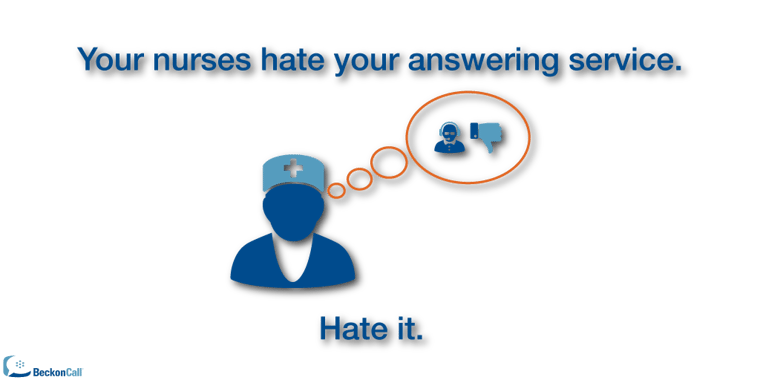 Posted by Dr. Becker on Dec 22, 2016 8:53:49 AM
Posted by Dr. Becker on Dec 22, 2016 8:53:49 AM

There’s not a lot of ambiguity in the title of this post. Your nurses do, in fact, hate your answering service. We know because they’ve told us.
The simplest reason why is because of the significant discrepancy between what nurses want to be doing each workday and what they actually do. They spend too much time on the phone or filling out paperwork when they want to and should be working with patients. Trying to get in touch with a third party - whether it’s a specialist, send-out lab, imaging facility or even a patient - is an obvious challenge. However, trying to work through an answering service to connect with the on-call physician, a person who in theory should be right there when a need arises, adds an additional layer of unnecessary pain.
Getting the right doctor on the phone is a complicated, frustrating process. Everyone reading this will recognize it - nurses because you’re living it every day, and physicians and practice managers because you hear about it from your nurses:
A nurse digs around multiple locations in the office to find the correct telephone number for contacting the on-call physicians. She often has to sort through lengthy paper lists tacked to the wall and oversized binders of outdated call schedules. Once she manages to retrieve the number, she calls the answering service and likely spends precious time on hold. Eventually, a live operator comes on the line and takes the message, getting all the relevant medical details copied down for transmission to the physician. At least, that’s what they’re supposed to do. Operators working for answering services are not medically trained and therefore frequently make mistakes in transcribing the nurse’s message. Now the nurse hangs up and finally heads off to a patient’s room while she waits for the physician to call back. While she’s doing actual patient care, there’s another delay of up to 30 minutes before the answering service relays her message to the on-call physician. By then the nurse has moved on to other work and has primed things for a game of phone tag with the physician.
So, let’s make this very clear. Nurses hate your answering service because it takes too much time to get critical information to the recipient, with no guarantee that the information will be correct by the time it gets there, followed by too much time to get an answer.
A nurse using BeckonCall in a neuro unit talks about answering services this way:
“Calling answering services, having to spend time spelling out the patient names, date of births, call back numbers, etc. to a person on the other line who is having trouble hearing can be time-consuming. Along with the time to page, there is then the time it takes for that page to get sent out after hanging up, and waiting for the physician to receive the page and call back.”
Answering services leave nurses with workflows that are inconvenient and annoying, but the bigger issue is that the resulting inefficiencies negatively affect throughput and patient care. Your nurses would rather be helping sick people recover than spelling out names for an uninterested voice. Not because it helps them, but because that’s what they live to do. It makes no sense to use outdated, expensive tools that not only don’t help them accomplish their goals, but can actively prevent it.
Lastly, we all know how important clear communication is for both establishing and maintaining relationships. A medical office setting is no exception. Answering services can be detrimental to the nurse-physician working relationship because they create the hallmarks of bad communication: repetition, slow responses and mistakes.
Ask any nurse and we believe you will hear the same sentiment: Answering systems are a broken, outdated technology that they hate. Why not look for a better solution that will simultaneously improve staff morale and patient outcomes?
Actually (you knew this was coming, right?), you don’t need to look around. BeckonCall’s on-call management platform removes all of the barriers described above. In fact, nurses have been some of our biggest advocates for precisely that reason. If you have questions about why BeckonCall is a better option, ask them. Or, get in touch and we’d be happy to give you the rundown.
For you nurses reading this, we’d love to boost your efforts to convince administration at your facility that the old-school answering service isn’t the right solution. Please feel free to share this post if you think it will help.
Topics: Care team communication